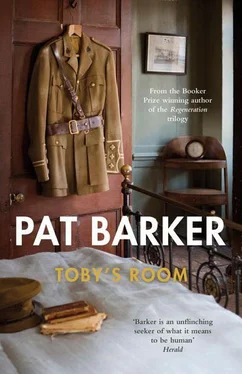Oh, Toby, why did you have to die?
Towards evening Neville’s temperature rose. A doctor he hadn’t seen before came and examined him. He leaned into Neville, speaking slowly and clearly, as if to a small child. ‘Try to sleep.’
Sleep? In this hellhole? The ward at night was never quiet, not for a second: squeaky footsteps, creaking mattresses, snores, groans, farts, the scream of a man struggling to escape from a nightmare, followed by the flap-flap of rushing feet, voices, half scolding, half reassuring, cajoling or bullying the dreamer back to sleep.
Neville fought off sleep as long as he could, but when, for the third time, the night nurse passed his bed and found him awake, she gave him a sleeping draught and stood over him while he drank it. After she’d gone he lay looking at the lamp on the nurses’ table. It shifted and blurred as lights sometimes seem to do in a high wind. It was raining too, great bursts of it hurled against the windows of the hut. How was anybody meant to sleep in this? But then, gradually, his eyes closed.
He was travelling again, the train bumping over points. His consciousness, the fine point that was left of it, still bright and sharp, like a needle tacking darkness …
Cattle trucks? He hadn’t expected that. He was used to columns of marching men, mud-coloured against a muddy road, dodging the sprays of slush and gravel that motor lorries flung up in their wake. But now, the carriages loomed up on his left as he stood with the others: indistinguishable, expressionless blobs, all of them, enduring the long wait with no more impatience than cows. So perhaps the trucks were appropriate after all.
The pressure of men behind moved the line forward. A group of officers, Toby Brooke among them, stood and watched. The trucks had white letters on the side: HOMMES 40; CHEVAUX 9. A damn sight more than forty men were clambering up the ramp into the dark interior. Was it French or simple arithmetic they couldn’t manage? He was being jostled and pushed, carried along against his will. A nail paring of a moon appeared between banks of black cloud. Not enough light to see faces by, just a silver gleam on the railway lines as they snaked away into the darkness.
He was about to set foot on the ramp when an officer shouted, ‘That’s enough!’ and so they had to march further along the track until they reached the next truck. He was among the first to enter, which meant he ended up in the far corner, a long way from the door. Shapes of men crowded in after him: miserable, grumbling hulks encased in cloth that the drenching rain had made as stiff as cardboard. Sighs and groans of relief as they took off their packs. He made the mistake of trying to sit down with his still on his back, toppled over, and lay there waving his legs feebly, like a fucking stag beetle. No straw on the floor, nothing, but at least in this truck they weren’t too badly packed in: there was room to move. Men began to set out their possessions, form circles, talk in hoarse voices that had been bellowing songs all day, though towards the end, as the rain pelted down on helmets and capes, they’d marched in silence. Some of them lit candles. The stumps were precious, had to be preserved, but crouched here like this, heading for the front, they felt the need for light. Card games were begun and bitterly argued over, people fanning the disputes to distract themselves from the immense, straining darkness outside.
Neville lit his own candle, settled down with his back to the side of the wagon, and sketched. They were used to him now, him and his endless drawing. It didn’t impress them, except when he drew portraits; then, they all gathered round and watched, amazed by his ability to get a likeness in a few quick strokes. The rest of the time, they were tolerant; they left him alone.
He looked around, imprinting the sight on his memory. Raw, red hands shielding guttering points of flame, the shadows cast on faces as they bent over the cards. Water cans were swigged, mouths wiped, hard biscuits bitten into with disgust. Somebody started a song — ‘Tipperary’, predictably — and the sound bounced off the walls of the truck until it seemed to vibrate like a communal ribcage.
The sweetest girl I know …
It was Elinor that he saw, not because she was the sweetest girl he knew, or even very sweet at all, but he’d just met her brother and that brought her, particularly, to mind. Her face floated in front of him, laughing and chattering, as he’d first seen her in the Antiques Room at the Slade. At that stage he’d only spoken to the men; contact between male and female students was discouraged. But he’d been aware of her, all the time. She was wearing a paint-daubed smock that fell straight to her ankles, a shapeless garment that nevertheless managed to hint at the firm, young body underneath. Pigeon toes poked out from beneath the hem. She stuck her tongue out when she drew. Elegant, she was not, and all the time, chatter, chatter, chatter … He’d assumed, then, that she was one of the young ladies who attended the Slade as part of their finishing, girls whose interest in art would fade as soon as the duties of marriage and motherhood claimed them. Quite a few of the women were merely filling in time till the right man came along. Not Elinor, though. He couldn’t have been more wrong about that.
The train lurched forward. As it gathered speed, draughts crept in through gaps in the sides and blew the few remaining candles out. Narrow bands of moonlight striped the floor. Many of the men were sleeping now, sprawled out, heavy limbs straining against wet cloth, sullen, cold, slack-mouthed faces pressed against kitbags and rolled-up coats. The air was full of snores, coughs, snuffly breaths: the same sounds horses or cattle would have made. Neville felt he’d begun to behave like a bullock, putting his nose to a gap in the wall, smelling, beyond the grit and smoke, moist green air, sucking it in, bloody great lungfuls of it. Cattle don’t know about the slaughterhouse, at least not until they smell blood. Only men have foreknowledge, and the thought of what was facing them kept him and others like him awake. Looking round, he could see, here and there among all the blank and shuttered faces, a glint where sleepless eyes caught the light.
Somebody said: ‘No, he’s dead to the world. I don’t think he needs any more.’
The face of a middle-aged woman in a nurse’s cap bent over him. He opened his mouth to ask her what the bloody hell she was doing here, but then the clackety-clack of the train reasserted itself and he couldn’t speak. The train juddered and shuddered and shook and rumbled through the night, displacing darkness that thickened again in its wake. Now, only one other man was awake: Mason — ‘Boiler’ Mason — though why so called Neville didn’t know. Boiler looked raw, underdone. Sunburnt skin stretched tightly over his cheekbones gave him a hyper-awake look, like a bird of prey. His eyes were china blue, doll’s eyes, hard and cheap. Neville had taken a dislike to him, and that was unfortunate since Boiler was another of Brooke’s stretcher-bearers. SBs, they were called. Silly buggers, they called themselves.
Towards morning he slept and woke to find the train still limping along. At this rate the war might be over before they got to the front. There were frequent stops: you could jump down on to the tracks and stretch your legs a bit. During these breaks the men sometimes sat back to back, leaning on each other, and passed round copies of the Daily Mail . They were free, one to every ten men. Neville was rather amused. Here he was at the front — well, more or less — reading about the war in the Daily Mail , and not believing a word of it either. He walked the length of the train and saw the officers’ accommodation: four to a carriage. As every reader of the Daily Mail knows, there are no class distinctions at the front.
Читать дальше












